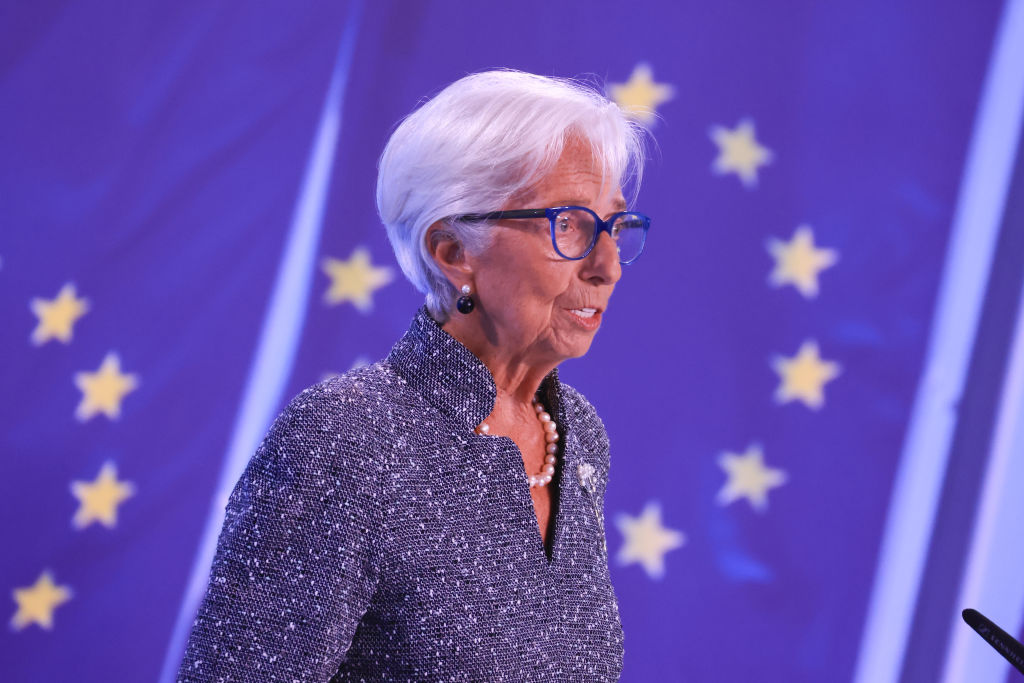It says something when two European Central Bank presidents responsible for directing Eurozone monetary policy for 14 years — Christine Lagarde and Mario Draghi — sound the alarm almost simultaneously over the trajectory of the EU economy. Speaking at a lecture organised by the International Monetary Fund on Friday, current ECB President Lagarde drew parallels between today’s economic environment and factors 100 years ago which resulted in the Great Depression.
“Today, like back then, we are seeing setbacks in global trade integration, at the same time as strides forward in technological progress,” Lagarde said. In the Twenties, the world economy was going through a period of “global fragmentation” following the collapse of Pax Britannica — developments which could be compared to today’s shift from American hegemony to a “multipolar” world order. New “economic nationalism” led to a “rapid unravelling of globalisation” and a steep decline in international trade.
At the same time, wartime innovations spilled over into the production of machinery, such as the internal combustion engine, on a new scale. Today’s leaps forward in digital technology — especially the excitement over the potential for artificial intelligence to boost productivity — echo the great technological advances and uncertainties of a century ago.
In linking these historical events to present-day developments, Lagarde aimed to favourably compare the actions of central banks today with those of their predecessors. “Over time central banks have recognised that stability should not mean rigidity,” she remarked, claiming “flexible policy toolkits” make banks “better placed to confront structural challenges”.
Such optimism, however, fails to take account of the role that policymakers have played in bringing about these unsettling historical resemblances. Throughout her speech, Lagarde chose to characterise the major events leading to today’s economic fragmentation — the Covid-19 pandemic, the war in Ukraine and the resultant energy crisis — almost as natural disasters, the effects of which policymakers have merely contained. She did not acknowledge the fact that much of the economic impact of these major events stemmed directly from voluntary responses by policymakers: Covid-era lockdowns and associated borrowing, sanctions on Russian energy, and the rush to Net Zero necessitating a wholesale energy transformation.
Other factors which have contributed to the rise of a new “economic nationalism” were also glossed over. Mass migration, which directly fuels the rise of nationalist political movements with protectionist economic agendas, received no mention at all. The protectionist impulse of the green energy transformation, with global powers vying for dominance in the production of key technologies, was not examined, and little was made of spiralling government debt throughout the Western world, most concerningly, in the USA.
Despite her headline-grabbing rhetoric around the parallels between the “two twenties”, Lagarde’s speech was, if anything, more revealing for what was left out. A fuller examination of the EU’s economic woes was provided in a competitiveness report made public this month by Draghi, Lagarde’s predecessor as ECB president. He described the “existential challenge” facing the EU economy, calling for more investment and less red tape, even advocating the creation of a “Commission Vice President for Simplification” to ease regulatory pressures.
Yet while Draghi’s call for a reduced regulatory burden drew praise from the likes of Elon Musk, it highlighted the EU’s in-built limitations on growth. The bloc’s inherent belief in regulation and centralised decision-making — the cornerstones of Lagarde’s confidence in central banks — is the very trait which makes the EU most likely to suffer amid deglobalisation and a new technology arms race.
That staunchly establishment economic policymakers such as Lagarde and Draghi are now sounding the alarm over Europe’s current economic trajectory is telling. Whether they have the wherewithal to ward off the ghosts of a century ago remains to be seen.










Join the discussion
Join like minded readers that support our journalism by becoming a paid subscriber
To join the discussion in the comments, become a paid subscriber.
Join like minded readers that support our journalism, read unlimited articles and enjoy other subscriber-only benefits.
Subscribe